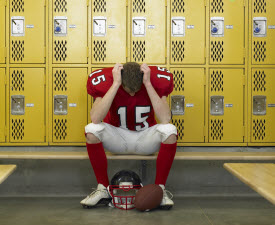
As the article, "Depression Prevalent in Ex-Players" explores, depression among these elite athletes is growing exceedingly common. Using personal stories from well-known players like Dwight Hollier, Eddie George, Junior Seau and Eddie "Boo" Williams, we come to see that retiring from the sport of professional football is immensely emotionally and mentally challenging for those who have devoted their lives to it. Whether it be related to a loss of identity and a drastic shift in their reality after saying goodbye to the sport, or a consequence of a condition called CTE (chronic traumatic encephalopathy) from repeated blows to the head, more and more football players are seeking help off the field.
"The depression Williams experienced after leaving the game is painfully common. Some of it stems from struggles with a loss of income, or diminished adulation, or the sudden isolation of no longer being part of a team and the camaraderie it brings. Even players who make a successful transition to the "real world" experience withdrawal pangs.
Asked how many retirees suffer from depression, former Packers offensive lineman Aaron Taylor says: "It'd be easier to start with which ones do NOT have depression. Observationally, it's a significant percentage. It varies by degree, obviously, but everyone struggles."
For decades, depression was only discussed in the shadows. Speaking about it publicly was viewed as a sign of weakness. But today, a light is being cast on it by retirees, their families, the league and the NFL Players Association because of life-threatening consequences -- a point that has been magnified with recent revelations linking depression with chronic traumatic encephalopathy, the degenerative brain condition caused by repeated blows to the head."
 RSS Feed
RSS Feed
